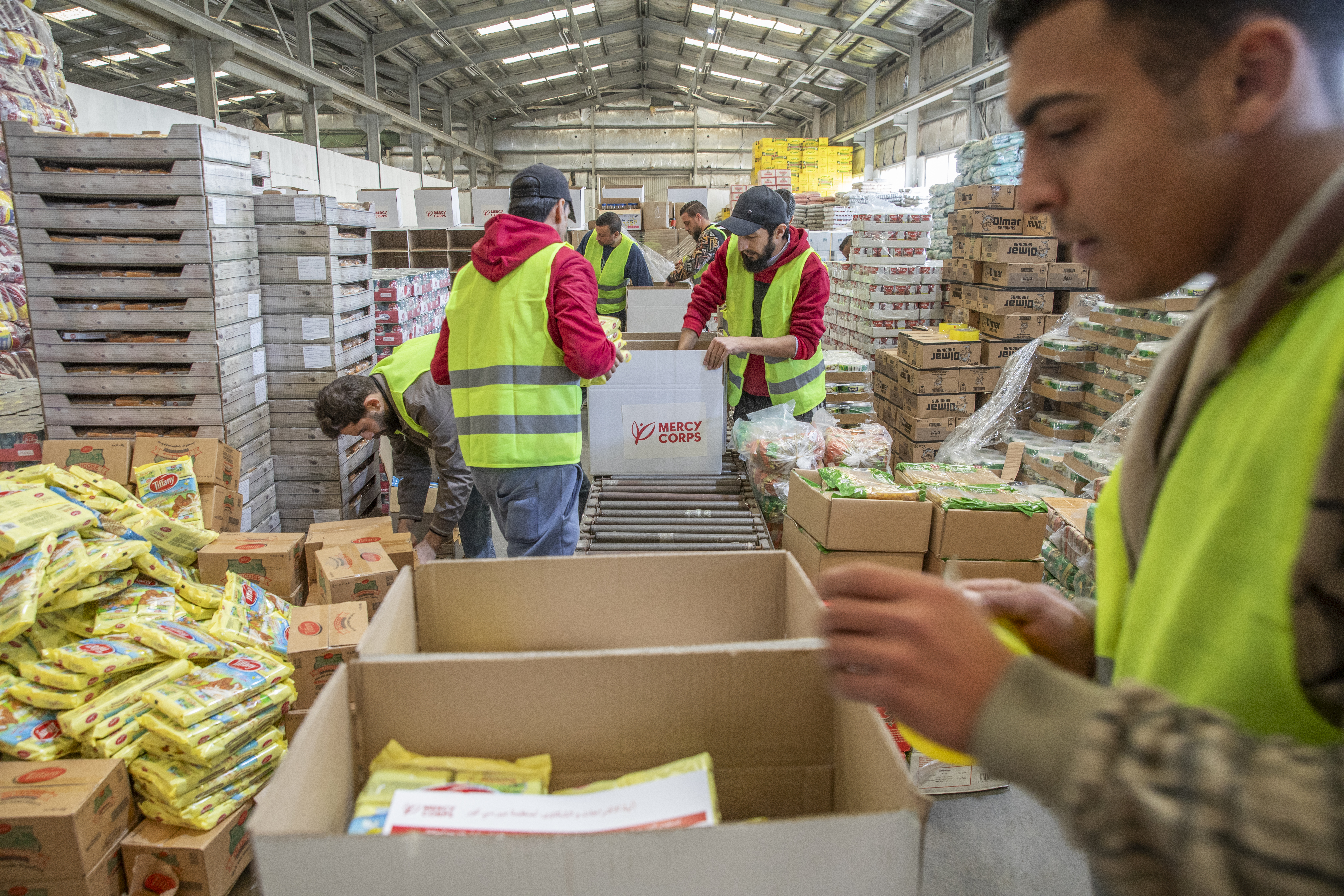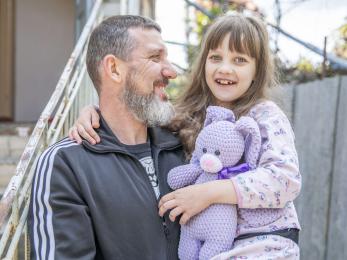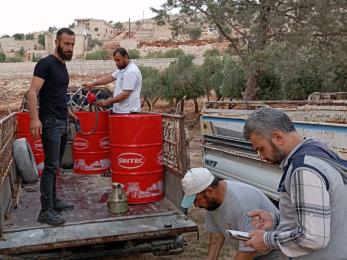This is what a refugee family looks like
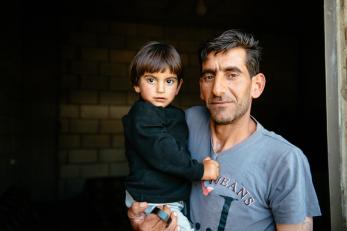
Today, at a moment’s notice, tens of thousands of people like Mohammed and 2-year-old Christina will be driven from their homes and forced to leave their communities, their belongings and the lives they’ve built. Tomorrow, tens of thousands more will make the same painful decision to flee.
Every day, more than 30,000 people are displaced by conflict and persecution. And the race for survival under these conditions leaves little time for preparation. Most people leave nearly empty-handed and with only their most precious possession in tow: their family.
Every refugee family looks different, and every story is unique. But, despite their differences, one common thread binds them all: love for one another and the will, above all, to stay together.
Below, meet more displaced families around the world who are working against the odds to overcome tremendous adversity and remain undivided. Then ask yourself: If you were forced to flee today, who would be by your side?
From Iran: Love puts young couple in danger

Navid*, 27, and Sheida*, 22, met three years ago through friends in Iran, a moment that would mark the beginning of a troubling journey.
As they began to fall in love, one dilemma weighed heavily on them: Sheida’s strict, traditional family had already arranged a marriage for her when she was very young.
But, two years into their relationship, Sheida had made up her mind. She wanted to be with Navid.
When she told her family she was in love with someone else and didn’t want to marry the man they had committed her to, she was badly beaten. A week later, Navid and Sheida were both arrested by Iranian social police.
After they were released, Navid received death threats from Sheida’s family and was fined $15,000 for stealing another man’s property. Sheida was subjected to a virginity test; if she failed and her family found out, she would be stoned to death.
The couple was out of options. If they wanted to be together — and stay alive — they had only one choice: run.
They quickly collected what money they could and left only with the clothes they were wearing; they didn’t want to draw suspicion. They’ve been traveling toward Europe for the past six months, barely scraping by and desperately seeking safety.
Despite the hardships and uncertainty they face, they must keep moving forward. They’ll be killed if they return to Iran, they said. They've sacrificed everything to spend their lives together — there’s no going back.
*Names have been changed to protect identity and safety.
In DRC: Struggling mother makes room for orphaned baby
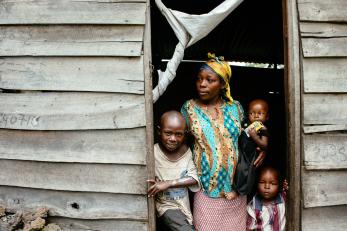
Over the years, Furaha’s family has been transformed by both compassion and tragedy.
After her husband left and her two oldest children passed away from illnesses, Furaha supported her two remaining children with income from a small restaurant she ran in eastern Democratic Republic of Congo. But DRC is a dangerous place to raise a family: The country has been wracked with warfare for two decades.
One night, one of the dozens of militant groups in the region attacked Furaha’s village. They robbed her home and restaurant, and raped her. No longer able to cope with the violence or provide for her children, Furaha walked her family 11 hours to a refugee camp north of the capital city, Goma.
Nine months later, she gave birth to her son, Theo, a result of the rape.
Life in the camp was difficult. Furaha and her three young children lived in a shabby, temporary shelter. Food and water were in short supply. Still, when Furaha heard about Alice, a premature newborn orphaned in the camp, she couldn't turn her away.
“[Alice’s] mother died giving birth. Her grandmother was giving her some water from the tap stands to keep her alive and moving all around the camp to find a woman who can nurse her … I told the woman, ‘I am a mother, and I'm living with [a] young baby, and I can take her. I felt inside me, a kind of love. I felt I’m a good servant, and I can take care of the baby.”
After adopting Alice, Furaha moved her family closer to Goma. She's trying to find work and better medical care for her adopted daughter, who is now two years old and still acutely underweight. Every day she struggles to feed and provide for her four children, but she isn’t giving up.
She dreams of starting a small business, of sending her children to school and of finding a permanent home for her family.
From Syria: Grandmother fights for large family

As the matriarch of her large family, Wadha (right) frets over keeping her children and grandchildren healthy, fed and warm. Since fleeing extremist fighting in Syria more than a year ago, they’ve been struggling to make ends meet in Turkey.
Turkey hosts 2.7 million refugees, more than any country in the world. But life here is not easy for this 18-member family with special needs. Wadha and her adult sons — one of whom is severely disabled — her daughter-in-law, and her 13 grandchildren all share one small apartment. Food is scarce and there isn’t enough money for the family’s medical care, including Wadha’s blood pressure medication and therapy and supplies for her son.
She fears for the children, all of whom are out of school. “I don’t want their future to be wasted,” she said.
A couple of the older family members find sporadic work as a cobbler and a tailor, but it’s not enough for all their expenses. Still, they’re doing the best they can to keep a roof over their heads as refugees in Turkey. They have to. Their home in Syria was destroyed, Wadha told us, and they have nothing to go back to.
The war in Syria has been raging for more than five years. More than 11.4 million Syrians have been displaced. Get the facts about the crisis in Syria ▸
In Nigeria: Widow remembers what she's lost
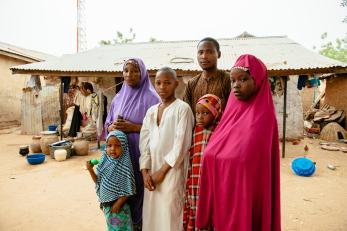
At home in northeast Nigeria, Hussaina and her family lived a happy, stable life. “We had a home, we had people, we had children. [It was] peaceful,” Hussaina said. “I was doing my business, making my money.”
That all changed when Boko Haram attacked their village. Hussaina’s husband died in the raid. In an instant, she became a widow and the sole provider for her five children. In that moment, they had no choice but to flee. “We were all running for our lives,” she said.
More than 2 million people have been displaced by the Boko Haram insurgency in Nigeria, and 7 million are in need of emergency aid. Hussaina knows the toll this violence is taking on the region all too well.
She and her children have sought refuge with other displaced families in a small compound in a different village. Nearly 40 people sleep together on the floor of the compound, and she has no money to buy food, household supplies or medicine, or to send her children to school.
Recalling what she’s recently lost nearly takes Hussaina’s breath away. “These are the things that, when I sit down and think about it, it stops me,” she said.
How we’re helping survivors of Boko Haram violence in Nigeria recover ▸
In Ukraine: Elderly mother cares for disabled son
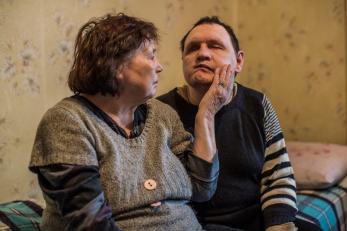
Nelly, 70 and a single mother, cares full time for her 40-year-old son, Igor. Despite nine attempted operations to restore his sight, Igor remains fully blind. Now, having been displaced from their home, he is also traumatized.
“I keep promising him that we will go back, but we are also worried that we will not be able to leave again because of the fighting and we will be stuck,” Nelly said.
More than two years of conflict in Ukraine has forced 1.8 million people from their homes and upended most basic services, including water, food, healthcare and banking. Nearly 3 million people are in need of humanitarian assistance, almost half of whom are children and elderly.
Nelly and Igor are from Luhansk Oblast, the site of more than two years of violent conflict in eastern Ukraine. For more than a year after the violence there erupted, they tried to stay in their apartment and remain close to Igor’s doctors. But as the fighting escalated, everything in their town shut down.
Nelly and Igor stopped receiving their government pensions, their sole source of income. The banks and shops closed, and their building’s water was shut off. The windows of their apartment vibrated constantly because of the nearby shelling. In those conditions, Nelly could barely take care of herself, let alone her disabled son.
The two have since taken refuge in a more secure town about 50 kilometers from their hometown. Igor misses the familiar surroundings of their apartment and the things he left behind; the change has been hard on him. But they can’t go back until there are peace and basic services, Nelly said. She can’t provide for Igor without them.
From Afghanistan: Single father must fend for children
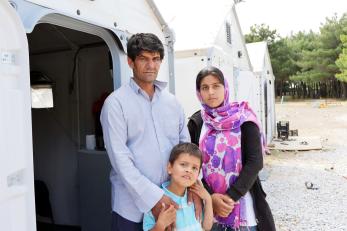
Asad is a single father haunted by loss, but one who is filled with resilience despite it. His wife was killed in a bomb blast more than a year ago, leaving him with the great responsibility of finding safety for their children, ages 5, 13 and 15. That’s not something easy to find in Afghanistan, the family’s home country.
Afghanistan has suffered protracted conflict for almost 35 years. It’s the second-largest producer of refugees after Syria: At the end of 2015, there were 2.7 million Afghan refugees around the world, including Asad and his family.
“We left Afghanistan about six months ago to flee the Taliban,” Asad said. He had just escaped after being kidnapped by the group. “They broke my arm and my teeth. I was tortured.”
To add to Asad’s anguish, their group came under military attack as they were being smuggled through the Iranian jungle. He was separated from his 13-year-old son in the frenzy. They haven’t been able to locate him since.
Now sheltering in one of the refugee camps in Greece, Asad’s daughter, Sahar, struggles with having lost her home and her brother. She misses her mom, her school and her friends. “I want there to be peace,” she said. “I don’t want there to be bombs. I want to have peace.”
Even though Asad doesn’t know what the future holds, he hasn’t given up hope. “I want a good future for my kids and to give them basic opportunities,” he said. “I know that I want them to go to school … Education is important for them.”
What we're doing
Mercy Corps works around the world to help refugees and displaced families survive crisis and recover for the long-term. In camps and communities in 22 countries, we help them meet their immediate needs like food, water and shelter, and provide cash so they can buy the things they urgently need to get by.
We build safe spaces to help kids heal and continue their development, we expand public resources in places where refugees are sheltering, and we implement educational and vocational programs so displaced people can get back on their feet and work toward peaceful, productive futures.
